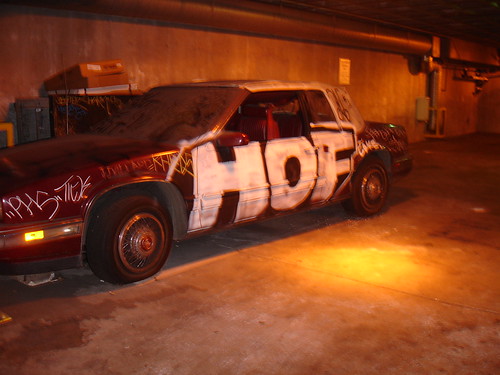Congress set to OK cash-for-clunkers bill
(Source: Detroit Free Press & Image: Jalopnik)

WASHINGTON — Congress appeared ready Wednesday to move forward on a bill to pay people to surrender their old gas-guzzlers for new, fuel-efficient models — but the auto industry hasn’t decided what it wants out of the program.
 While backers of a cash-for-clunkers plan announced a deal earlier this month, the final bill has yet to be crafted because of a last-minute dispute between foreign and domestic automakers over incentives for leasing. Environmental groups aren’t thrilled with the compromise, saying it is weighted too heavily toward truck buyers.
While backers of a cash-for-clunkers plan announced a deal earlier this month, the final bill has yet to be crafted because of a last-minute dispute between foreign and domestic automakers over incentives for leasing. Environmental groups aren’t thrilled with the compromise, saying it is weighted too heavily toward truck buyers.
But with House and Senate leaders, along with President Barack Obama, voicing support, industry officials say they are hopeful a bill that will boost a lethargic market for new vehicles will get through Congress in weeks. Backers say the compromise would cost about $4 billion — paid for by money from the economic stimulus plan passed earlier this year — and could boost sales by 1.3 million vehicles over a year, according to industry officials.
Owners of cars and trucks that get less than 18 m.p.g. could get a voucher of $3,500 to $4,500 for a new vehicle, depending on the mileage of the new model, but no trade-in value because the vehicles would be scrapped.
“This is a jobs bill that helps the environment,” said Ziad Ojakli, Ford’s group vice president for governmental affairs.
The plan does have several hurdles that will keep some potential buyers on the sidelines. The clunker being traded in has to be kept off the road — meaning it will have no trade-in value beyond the voucher. Far more trucks on the road will qualify for the vouchers than cars: even 15 years ago, only five models of midsize sedans managed just 18 m.p.g.
And while the compromise among U.S. House members was unveiled earlier this month, the actual bill will be kept under wraps until it is introduced with the House Democrats’ plan to control carbon emissions through a cap-and-trade system, expected no later than Monday.
Although cash-for-clunkers programs in other nations have been motivated by environmental goals to improve the mileage of vehicles on the road, environmental groups are lukewarm about the U.S. compromise.


